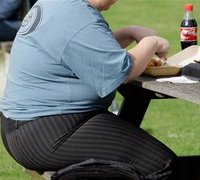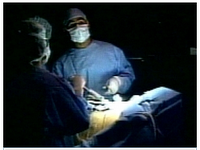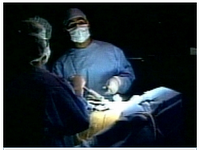Los Angeles, CA
Within days of various weight-loss surgeries, blood sugar levels become easier to manage -- or are normal.
The discovery came about by accident more than a decade ago: Weight-loss surgery often led to dramatic improvements in the control of Type 2 diabetes, often before patients had even left the hospital.
Today, evidence of the connection is so solid that some doctors say surgery should be considered as a treatment for diabetes, regardless of a person's weight or desire to lose weight.
"We thought diabetes was an incurable, progressive disease," says Dr. Walter J. Pories, a professor of surgery at East Carolina University and a leading researcher on weight-loss surgery. "It . . . is a major cause of amputations, renal failure and blindness. This operation takes about an hour, and two days in the hospital, and these people go off their diabetes medication. It's unbelievable."
As many as 86% of obese people with Type 2 diabetes find their diabetes is gone or much easier to control within days of having weight-loss surgery, according to a meta-analysis of 19 studies published earlier this year in the American Journal of Medicine (78% of patients with a remission of diabetes and 86.6% with remission or improvement). But experts still aren't sure why obesity surgery helps resolve Type 2 diabetes or how long the effect might last. And they disagree on how big a role surgery should take in treating the illness.
"We are going from seeing the results to understanding why it happens," said Dr. Santiago Horgan, director of the Center for the Treatment of Obesity at UC San Diego.
This much is clear: Patients who have weight-loss surgery begin to lose weight rapidly, which by itself improves Type 2 diabetes, allowing diabetics to more easily control their blood glucose levels. But something else appears to be occurring as well.
There is strong evidence that surgery -- especially gastric bypass surgery, which makes the stomach smaller and allows food to bypass part of the small intestine -- causes chemical changes in the intestine, says Dr. Jonathan Q. Purnell, director of the Bionutrition Unit at Oregon Health & Science University. The small intestine has been thought of simply as the place where digestion occurs.
But researchers now suspect it has other functions related to metabolism. Surgery somehow alters the secretion of hormones in the gut that play a role in appetite and help process sugar normally.
Multiple studies in humans and animals indicate that surgery triggers reductions in ghrelin, the hormone that stimulates hunger, and elevates levels of peptide YY and glucagon-like peptide-1, both of which act as appetite suppressants. Another theory is that surgery might alter the expression of genes that regulate glucose and fatty-acid metabolism.
"There are these known components that improve glucose metabolism," Purnell says. "But there are very likely other things happening as well."
Which procedure?
The effect on diabetes can depend on the type of weight-loss surgery that is performed, says Pories, past president of the American Society for Metabolic and Bariatric Surgery. The highest rates of diabetes remission are seen in people who have gastric bypass -- about 83%.
But diabetes also tends to resolve or improve in 50% to 80% of people who have lap-band surgery, in which a band is placed around the top of the stomach to make it smaller, he says. And there is some evidence that the effect occurs a newer type of weight-loss surgery called gastric sleeve, in which a portion of the stomach is removed so that it takes the shape of a tube or sleeve.
Evidence suggests the effect on diabetes can last for an extended period or even indefinitely, particularly if people don't regain a lot of weight.
"There is durability, but we also know that some people do get the disease back again," Purnell says. "Weight rebound is probably one factor. We also know that diabetes is a progressive disease. It may depend on how long you've been diagnosed with diabetes. If it's early on, I think the durability may be better."
It's not clear yet why people have different responses.
"There is some evidence that African Americans don't respond as well as Caucasians, and men don't respond as well as women," Pories says.
Despite the unknowns, the evidence that a majority of people experience long-term improvement in blood glucose control suggests the surgery could eventually play a greater role in the treatment of obese people with Type 2 diabetes. The majority of American adults with Type 2 diabetes are overweight.
Traditional medical guidelines, which insurers follow, state that weight-loss surgery should be restricted to patients with a body mass index of 35 or greater who have related health problems. But some diabetes and nutrition experts think those recommendations don't go far enough. Several studies are underway, or will soon begin, to examine the benefits of surgery in people with Type 2 diabetes and a BMI of less than 35.
"We may have a cure for diabetes," Santiago says. "So we need to ask how medical therapies and surgery can help each other in the treatment of diabetes."
Studies from several other countries show that surgery also results in remission of diabetes for people who are not morbidly obese. There is even discussion, particularly in other countries, of performing weight-loss surgery for people with Type 2 diabetes who are not overweight.
Not without risks
In the United States, weight-loss surgery is still largely viewed as a cosmetic procedure and obesity as a lifestyle issue, not a chronic disease. Moreover, weight-loss surgery carries risks. The death rate is about one per 200 operations and severe complications can occur, including blood clots, infections related to surgery, and the need for corrective surgery due to leaks at the staple lines.
Other complications include vitamin and mineral deficiencies, dehydration, gallstones, kidney stones, hernia and low blood sugar.
However, a risk-benefit analysis published in April in the Journal of the American Medical Assn. by Purnell and a colleague suggests that if the number of gastric bypass operations performed on diabetic patients increased to 1 million per year, as many as 14,310 diabetes-related deaths might be prevented over five years.
Surgery also leads to other health benefits besides weight loss and better control of diabetes. Patients often see improvements in blood pressure, cholesterol, gastroesophageal reflux disease and sleep apnea.
"Doctors say, 'If I can lower glucose by medications, why send patients to surgery?' " Purnell says. "Surgery, however, allows people to have meaningful and sustained weight loss and their diabetes is better. There are risks involved with surgery, obviously, but it makes sense, to me, to do surgery."
The discovery of the gut hormones that play a role in appetite and insulin regulation may also lead to new medications for Type 2 diabetes, Pories says.
"You can't operate on 31 million Americans," he says. "But if we understood this mechanism and what are the molecules secreted by the intestines that cause diabetes, then we can cure it with a pill. I would not be surprised if, in the next five years, we have new medications."
Labels: gastric bypass diabetes, gastric bypass surgery, obesisty risks, patient stories













